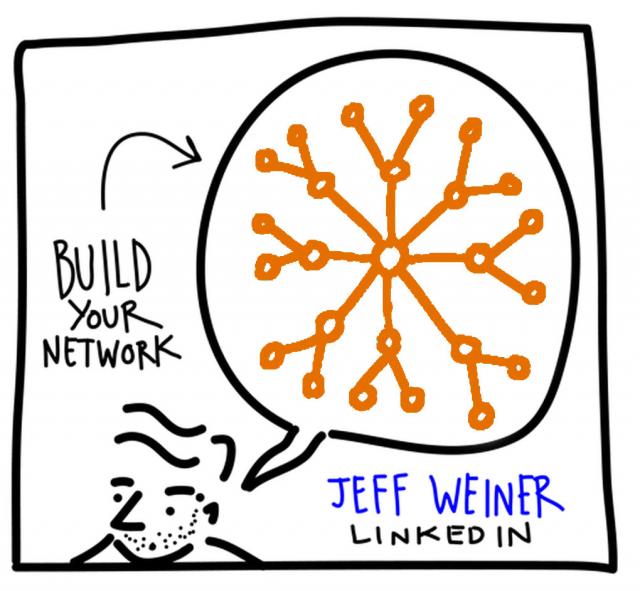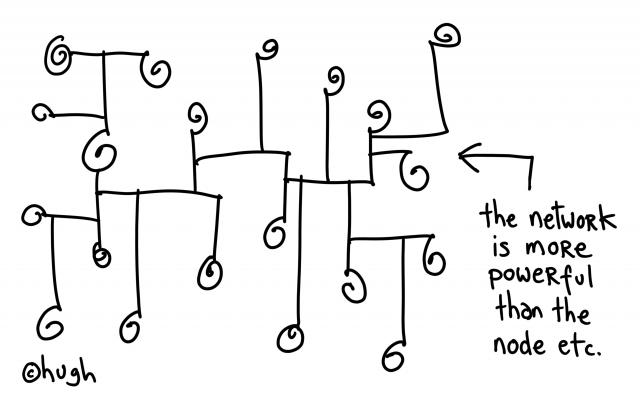
Get your FREE 30-day trial.
Please complete all fields.
This is my professional LinkedIn network. The closer I dig into it, the more interesting it becomes (and the more stories it seems to tell), but my network has taken on a whole new meaning after an event I hosted with LinkedIn last week...

It was a fireside chat with the different teams from ExactTarget Marketing Cloud and European Director at LinkedIn, Josh Graff. The event was a lot of fun, but one quote seemed to resonate with everyone more than the others:
"The value of your network is greater than the value of the services you provide."
It's a quote from Derek Coburn that I heard on Mitch Joel's Six Pixel's podcast and it really made me think-all of us are selling something to someone. Whether you are selling a product or service (or an idea, an opinion, or a perspective), we are all "selling" our stories and because of this, the networks that we are a part of are often the largest assets we own. Let me explain...
If you are selling a service or a product and you've ever tried to compete on price, you'll know that this strategy is flawed (because it takes such a short-term view), due to the competitive nature of the marketplace and the lack of loyalty with discount-seekers. Only one [brand / service provider / person] can ever be the cheapest and chances are it's not you, so you need to compete on value.
And by value I don't mean price. I mean caring more than your competitors, providing better experiences and more responsive customer service, etc... but I also mean sharing the power of your network. Recommendations. Referrals. Helpful advice.

A couple of years ago Oxford University Research produced a study which stated:
"Only 14% of people trust brands, but 78% of people trust their friends."
It was a strong quote that I've heard bounced around so many social conferences and shared on the web, that I've struggled to find the original source (drop it in the comments if you find it). My point is that the value of the advice you give, useful links you share, recommendations you make, and referrals you provide, are often likely to far out-weigh the value of any services you offer. So even if your competitor does come in with a cheaper quote than you next time, chances are you'll keep the business based upon the strength of your relationship with them and the power of your network. Kevin Roberts of the ad agency Saatchi calls this "Loyalty Beyond Reason."
So to help you continue to build your own network, I thought I'd share a few principles which seem to have worked for me and some of the people I follow...

1. Study Your Network
LinkedIn's mission is to "Connect the world's professionals to make them more productive and successful". You can never study your LinkedIn profile too much. Try to take the time to see who is connected to who and how. Following everyone's updates by logging into your profile each morning is the obvious answer, but studying your own InMap is a good way to get a different perspective. [Create your own InMap here]
2. Invest in Yourself
Keeping up-to-date with your industry and sharing any useful insights, ideas or contacts (with people who you know will value them), is probably the quickest way to build trust and credibility. The Six Pixel's podcast that this post has been inspired by is well worth a listen [episode #408 with Derek Coburn here], but I'd recommend that you take the time to find podcasts and blogs that inspire you. If you don't want to listen to your favorite podcasts on the way to / from work, ask people who you look up to for recommendations of the best books or articles they've read recently. It's impossible to over-invest in learning from inspiring content.
3. Be Ruthless on Twitter
I wrote a blog post here that you might find interesting about how I use Twitter, but being ruthless with regards to who you listen to is the key. For me, Twitter is the best place where I can spend 15 minutes and add instant value to lots of people in a variety of different ways. I used to post a lot of personal stuff, but I decided last year to only post professional content, since everyone was complaining that their newsfeeds contained "too much noise". I now try to act like an extension of my follower's marketing departments, only posting stuff I think they will find useful, and it must have worked-I have gained over 30,000 followers since I adopted this new strategy.
4. Get Up Early
Being disciplined enough to find 15-30 minutes each day to study your networks, is likely to be the best daily investment you can make in your professional life. It's a tough thing to do, but people will love you for it. I find it easiest to wake up early, get my favorite coffee and then spend 30 minutes reading my favorite blogs and news sites before I open any of my emails.
Becoming an influencer comes from sharing anything useful with specific people, who you think may appreciate it. (Just posting links up on Twitter won't cut it!). In the past I have used RSS readers or Flipboard to aggregate all my feeds, but now I get most of my news from Twitter and my LinkedIn newsfeed.
5. Listen to Zig
Zig Ziglar, the great sales trainer and motivational coach of the 70's and 80's, came up with one of my all-time favorite quotes,
"You can have anything you want in life, if you just help enough other people get what they want."
Perhaps you're realizing if you've read this far that all this isn't rocket science. In fact it has very little to do with digital marketing at all, but of all the successful people I've ever met-the ones who genuinely care about their networks (and the audiences who follow them)-are often the most influential and the happiest. I like the way Brian Solis puts it, "Digital marketing has more to do with psychology and sociology than technology."
6. Become an Industry Influencer with LinkedIn
Wherever you get your news from (traditional papers, Twitter, BBC, Bloomberg, WSJ, FT, LinkedIn, Pulse, or Flipboard), doing something useful with that news is what's going to position you as an influencer. If you have not already applied, I recommend applying to be on the invite list for LinkedIn's BETA Influencers program. There are currently 2 million influencers after an initial trial run of 500 thought leaders. It is so powerful, Richard Branson now has more followers on LinkedIn than he does on Twitter! [Request an invite here]
7. Read the Greatest Business Book Ever Written
You are probably not surprised to learn that Dale Carnegie's book, "How to Win Friends and Influence People" has sold over 15 million copies. What you might be surprised to learn is that while it was written in 1936, it still reads as if it was written this year. I was amazed to read about how the business people of the 1930s were struggling with exactly the same things that we all struggle with today; Building our networks. Growing our influence. Developing deeper connections both professionally and personally. If you haven't read it before (or know of it and thought it wasn't relevant today), I'd encourage you to think again and take the time to read it carefully. (If you already have, I'd love to hear you thoughts in the comments)
8. Chase the # NOT the @
It's OK to grow your network, but don't mistake this for thinking that you need to "own" it. You do not need to buy likes, followers, or subscribers. What you do need to do is get involved in relevant conversations by spending 80%-90% of your available time adding value to your chosen community by engaging with them. It's worth taking 3 minutes to listen to this brilliant Gary Vaynerchuk video ~ he can put this rule into words much better than I can.
9. Make it as Easy as Possible for People to Recommend You
Have a well written up-to-date LinkedIn profile. Be active on Twitter. Blog. Comment on relevant blogs and industry forums as much as you can. Get involved in LinkedIn discussion groups. Find out the most relevant platforms that your audience cares about. I am not a huge fan of Facebook Messenger, Line, SnapChat, or WhatsApp, but I am very active on them because the people I care about are. It's amazing how many people will find you via your comments.
Recommendation: At the moment I'm feeling a lot of love for blogging platform Medium (for the quality of the writing) and Ideapod (big ideas in 1,000 characters).
10. Don't Have Professional One Night Stands
Be respectful of your audience. If a brand interrupts you in a bar to try to sell you something, you'd be pretty upset. So be respectful. Treat your networks the same way that would would if everyone was with you in that bar. Work the room. Be engaging. Have (funny) and useful things to say. Be polite. But don't try to close the deal the second someone 'smiles' at you. Too many business professionals try to sell things without ever having a genuine conversation.
When I talk to brands, I talk about the battle between "click-to-buy" and "click-to-share " and how it's important to understand when each one is appropriate. Influencers give things away before they ask people to buy from them.
Lastly, I'll leave you with the advice that LinkedIn gave us at the end of our fireside chat:
It's beautifully simple advice, but if you want to build your network, become more influential, and make a difference professionally, these are pretty good words to follow.
